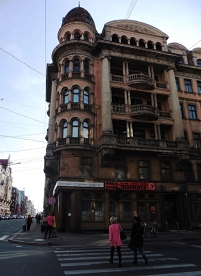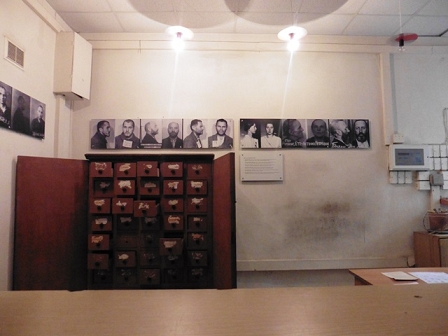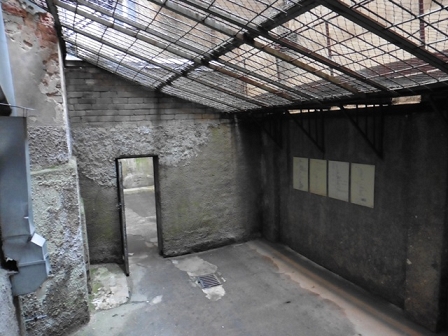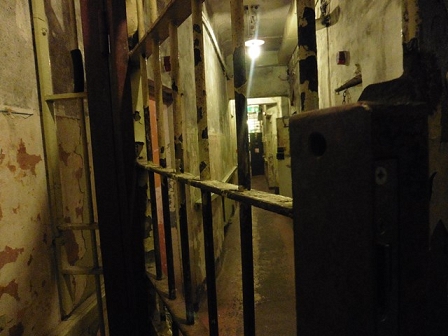Erstellt am: 20. 5. 2015 - 14:23 Uhr
Betrayal At The Corner House
This Saturday's Reality Check Special comes from Latvia as it marks 25 years of Independence, amid new fears of Russian dominance, and surviving the "world's worst recession". Latvia: Rolling With the Punches on the 23rd May at 12:00
The KGB agents would come in the dead of night, Agatha tells me, and then they’d take you away in an unmarked and windowless van.
"There’d be a harsh knock on your door and when you’d open there’d be three or four officers who would barge into your home and start searching your flat. You couldn’t even ask what they were looking for because they said if they told you, you’d hide it."
Enemy of the State

Christian Cummins
Actually, she says, they probably wouldn’t know specifically what they were looking for, but they knew they’d find something incriminating: a Latvian flag or even a song book was enough to condemn you. You were an "enemy of the state". Records show that one group was imprisoned because its members’ admiration for French literature.
Agatha is showing me around "The Corner House" – Stūra māja in Latvian – a soot-smudged, peach coloured art nouveau building on a busy junction just outside the centre of Latvia’s capital Riga. During Soviet times it was here where abducted Latvian citizens were taken, interrogated, imprisoned, tortured and often executed.
A Poignant Time
This month Latvia has been marking 25 years since that dark period was brought to a close with the declaration On the Restoration of Independence in Latvia – a document that, after months of struggle, precipitated the end of the Soviet rule. So it is a poignant time to visit this site that has only recently been opened up to the public.
"I believe that this time will go away like bad nightmare", the famous Latvian political dissident Gunārs Astra told a kangaroo court. He didn't see the end of the nightmare – he died in a Soviet prison – but here on the crossroads where the Brivabas Boulevard meets Stabu street you can revisit the nightmare that Latvia is still gingerly coming to terms with.
The Horror of Totalitarianism
After a quarter of a century of lying in a state of emptiness, the building was reopened as a museum during Riga’s stint as European Capital of Culture last year. After a quarter of a century of neglect, it looks as if the Soviets had only just moved out. Many survivors have returned and wept, says Agatha, or shared their stories of the brutality that took place within the walls of the Corner House. The horror of totalitarianism is still a living memory for many Latvians.
Even for a visitor from abroad, the house still feels haunted; the air feels stale and clammy, even the peeling yellow paint speaks of terror. This is a warning from Latvia’s specific history, explains Agatha, but also a spectre of the present. "When you come here you should think that what went on here is still going on in many parts of the globe. These things are still happening." The concept of the police state did not die with the Soviets, it is alive and depressingly well under repressive regimes in North Korea, Eritrea and beyond.
This is a very personal issue for Agatha. Her own grandfather was "disappeared" by the KGB. She says "almost every family in this whole country was in some way affected by this place." Agatha takes me to the registration room where the prisoners, often unaware of why they had been abducted, were subjected to an all-orifice naked strip search and barked at in Russian.
Behind the simple wooden counter, the mug-shots of some of the former prisoners are now displayed. Some look understandably terrified. Others appear strangely defiant. Few who were ever brought here were released back into the streets of their homeland; the best they could hope for was to survive the obligatory torture and be sentenced to deportation to Siberia for 10 years.

Christian Cummins
The cells, built for four, housed up to 20 prisoners. The bright lights were left on 24 hours a day. Prisoners couldn’t even shield their eyes from the light; they were forced to lie on their backs.
The room was kept artificially warm, over 30 degrees, to induce torturous thirst and there was no ventilation. "It smelled of sweat and blood and the bucket that was used as a toilet."
A Glimpse of Everyday Life
Once every ten days prisoners were allowed a few minutes in a cramped yard where they could smell the cooking from the homes in the adjacent apartment block and, if they were lucky, catch the sight of a bird in the sky. These were precious glimpses that ordinary life existed beyond the hell of their incarceration.

Christian Cummins
During the night prisoners were dragged out to be interrogated. Agatha takes me to the sort room where confessions were beaten out of the abducted Latvians. There is a small desk with two small chairs and a hard rubber truncheon.
"Everything that was done in this building was done to break you down as fast as possible. They wanted you to sign a confession, even if you knew the accusation was absurd and by signing it you were signing your death warrant."
Crimes included being part of a student fraternity or singing in a choir suspected of singing nationalist folk songs. You could be arrested on the basis of flimsy claims that you had once, in some way, praised the pre-war Latvian Republic.
The Soviet oppression of Latvian culture was unrelenting. In 1949 42,000 Latvians were deported to Siberia, including almost the entire intelligencia of this country.
From an echoing inner courtyard, you can see the bars on the 5th floor windows where the torture took place. "The torturers would leave the curtains drawn and then leave the room. Often desperate prisoners would lunge and the windows to try and commit suicide but of course be stopped by the bars. Then the interrogators would come back into the room and claim that the suicide attempt was a declaration of guilt."

Christian Cummins
And if you had signed the form admitting "guilt" you were executed in a garage-like room opening onto the courtyard. The prisoners were informed of their imminent death just 5 minutes before facing the firing squad. "If you struggled they would beat you up and throw you against the wall," explains Agatha. The room was lined with plastic and the engine was left running in a van in the garage to try to disguise the sound of the shots to the outside world.
That wasn’t the end of the torture for the family. "They lied to you all the time," says Agatha. "They never told you your relative was dead. They told you he or she’d been moved to a different place so you went crazy wondering what had happened."
It took decades of enquiry to find out his fate, years of conflicting stories. The uncertainty for the family left behind was part of the technique of terror.

Christian Cummins
No Closure?
I suddenly feel very angry. It’s said that although the KGB was outlawed in Latvia and its former agents were banned from entering post-Independent Latvian politics, many went on to forge successful careers in business, using their contacts in Russia. It is thought that some of the former agents play important and influential roles in Latvian society today.
The files on the victims have been opened but now there is a raging debate on whether the files related to the perpetrators should now be opened too. Many Latvians feel it is necessary to bring closure to the Soviet chapter in their history and help the country understand itself fully. Others fear that opening the files could tear Latvian society apart by revealing who spied on whom and who prospered despite the portrayal. They argue that a country of two million, which is already somewhat divided linguistically, cannot not afford to reopen old wounds. Better not to dwell of the past, they say, but to look to the future.
But although Agatha has no chance of finding out the names of those responsible for the death of her grandfather says she is "at peace" with the past.
"I used to be angry but not any longer. I’m not OK with everything that happened here but I am at peace with it. I think that by showing people around here and talking about it I have found closure. It’s a way of doing something for the victims."


